Real talk, real change: an interview with skateboarding agent Yulin Olliver
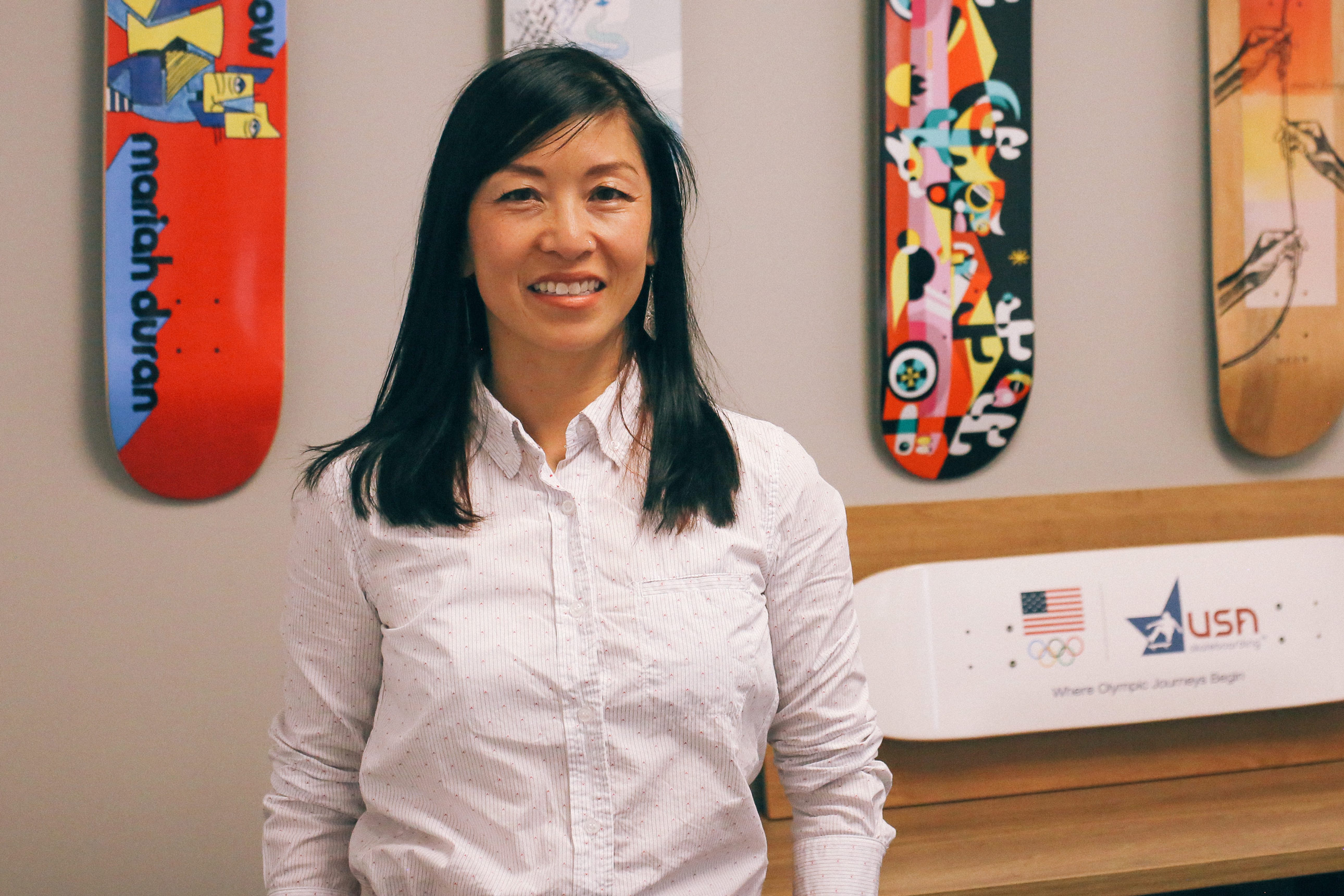

Making miracles happen and living out the motto to “push possible” is all in a day’s work for Yulin Olliver. A powerhouse action sports agent at Wasserman, her clients in skateboarding include game-changing Leo* Baker, whose rising profile signals the far-reaching new influence that skaters of any gender can have inside of skateboarding and also transcending it.
Both a visionary and sharply focused on outcomes, Olliver shares some of the gains she’s achieved in collaboration with the top skateboarders she represents, and where next generation skateboarders might see their own careers heading in the future.
Olliver also represents Jenn Soto, Mariah Duran, Samarria Brevard and pioneers Vanessa Torres and Cara-Beth Burnside as well as a list of other exceptionally skilled and dynamic woman skateboarders and snowboarders killing it on the world stage. Warm, wise, philosophical and savvy, Olliver brings a whole lot to the table when it comes to advancing the status and visibility of women, non-binary, gender fluid and queer skaters in the skateboarding industry. This includes her wisdom from years of business marketing and PR experience and her open-minded embrace of creative thinking and skater D.I.Y. can-do attitudes.
To understand the passion she brings to her work is to understand the influence of her key people and experiences in her earlier life. This includes as an Asian American daughter of migrants growing up on the East Coast of the US, as an avid and competitive snowboarder, and as someone who sharpened their skills learning the ins and outs of business and marketing in the professional realm of men’s skateboarding. In this interview she talks about what fuels her determination and drive today to see an abundance of opportunities for all genders in skateboarding, not just men.

Can you tell me a bit about your family? What type of things have you inherited from your parents that influence who you are today?
My parents are both born in Taiwan. My father’s side comes from a long line in Taiwan. My mother’s parents and sisters were actually in mainland China. My parents settled in the US after graduate school in the US.
My parents always considered what would be ideal in this world, like “what could we aim for, to make it a better place?” My mom has always been a supporter of the under-dog type person and my father was always a visionary. He’ll be like, ten years ahead of his time in terms of what technology and the world looks like. He’s a successful tech entrepreneur who changed the world as we know it. He had a pivotal role in smartphones streaming video.
And my mother always wanted to make sure I was independent. To her, having to depend on people was something she really wanted to make sure I didn’t need to do. Between my two parents I learned about being independent and really being raised to be fully self-expressed, and to support the under-dog. And to think, “what’s possible and what’s not in existence yet, is absolutely in our reach.” Like, just create it.

Although Asian American in heritage — which is an interest in my current research on the history of Asian Americans in skateboarding — you are also active in building bridges between Asia and America, and across the globe, in terms of promoting international women’s skateboarding. This includes your role in the Skate Exchange project last year, which brought the world’s best woman skateboarders together in Japan, hosted by the Women’s Skateboarding Alliance. Were you highly in tune with your Asian heritage and did you have any Asian American figures you looked up to growing up?
Kim Woozy [founder of Mahfia TV] was kind of the first Asian Americans I really knew. I grew up in the suburbs of Boston. And then when I went to university, I was surprised because of the way I was treated, because I’m “Asian on the outside.” I was treated as someone very foreign. People would sometimes speak slower. Or louder. Or ask if I was in a foreign exchange program or something. So really in action sports it was just so neat to meet Kim because she was the first Asian American with similar interests that I’d ever met.
And I now very much partner with Crystal Yang who I only found out a couple of months ago that we speak the same language and that she’s from Taiwan too. Her clients and projects include the Vans US Open of Surfing, X Games and the Dew Tour. And she now has her own agency Make Waves Communication. We both actually have kids who are the same age and we’ve both married Caucasians.
And it is really fun to meet other Asian Americans. Especially in action sports. What I really got from it was, we’re so different from each other even though we’re all Asian American. There’s so much diversity. Like Kim looks so different from me and so does Crystal to the point that I didn’t even know that they spoke the same language as me.
“I learned about being independent and really being raised to be fully self-expressed… and to think, what’s possible and what’s not in existence yet is absolutely in our reach.”
Yeah Kim’s amazing. I interviewed her five years ago and she described you then as instantly becoming “a mentor and now is a good friend” and was happy to surround herself, “with people who are talented, hard-working, positive…” And like you, she also loves action sports and has transferred that into being one of the leading champions of increasing the visibility and opportunities for woman skateboarders. A career in action sports, as an athlete or other, is also still a lesser heard of pathway not just for women, but also Asian Americans with more traditional-minded parents.
Yeah, I packed up all my earthly belongings in a little pink Tercel and I drove from Massachusetts to Oregon and that’s where I started my new life. I lived out of my car and set up in a cabin with bunk beds and roomed with like ten girls in one room one winter. All to snowboard.
My father couldn’t find much to say to me for about a year, like he didn’t know what to think of my choice to leave veterinary school for snowboarding. He was like, “man, you just basically went from a set path to no clear career path as an aspiring professional snowboarder.”
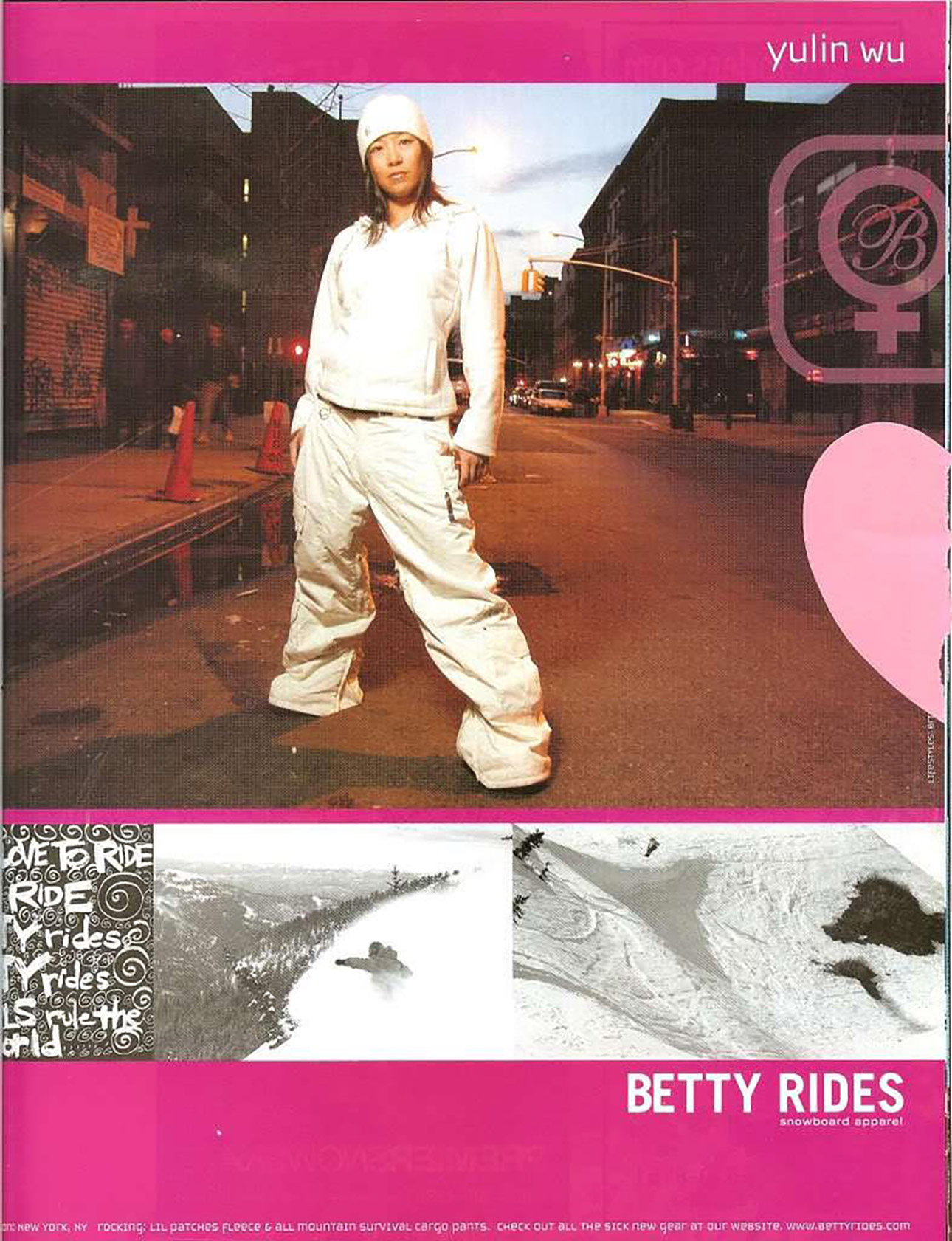
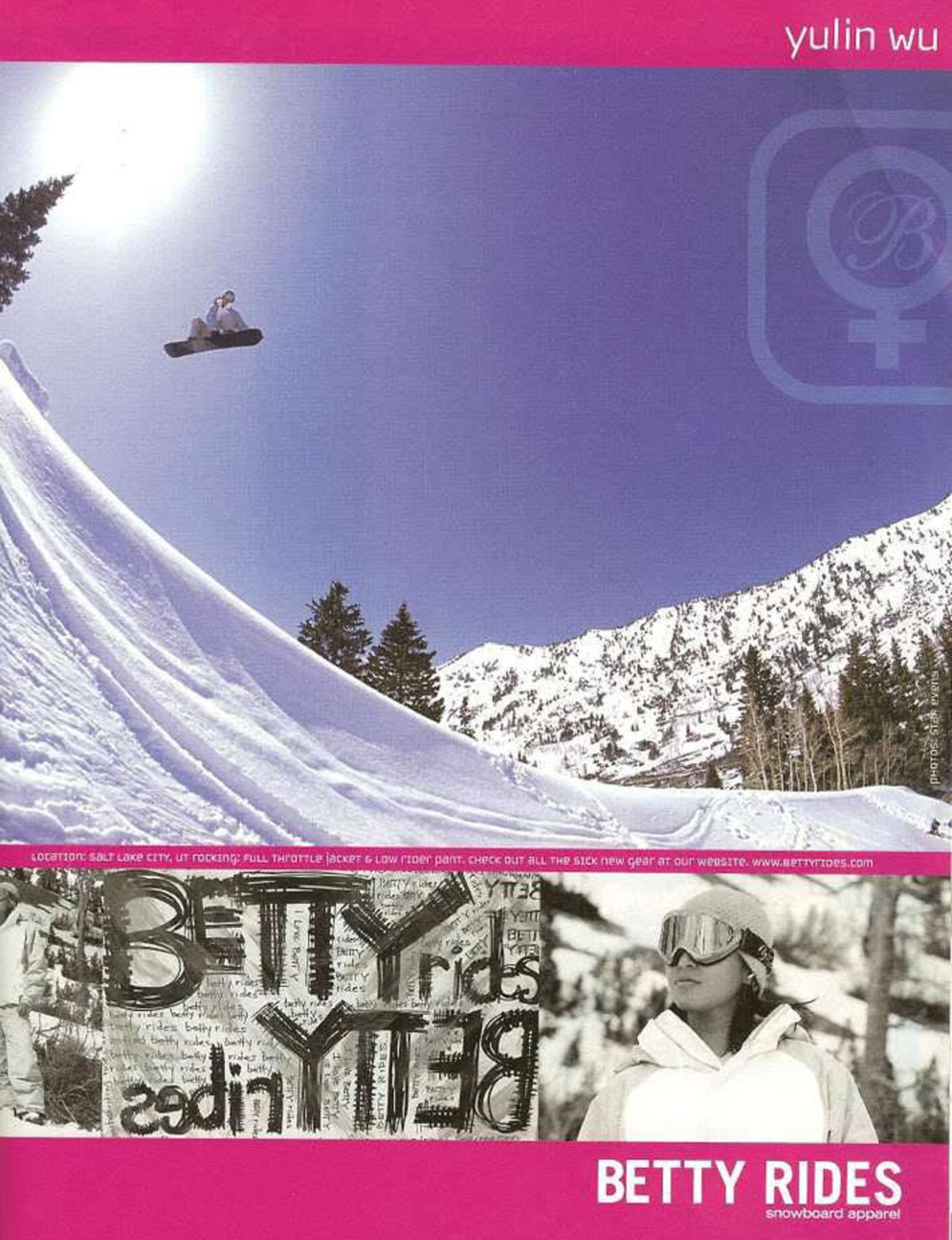
Let’s talk about your love of snowboarding.
My grandfather was a poet, a writer, and a painter of old Chinese calligraphy. I only just discovered a couple of years ago that his pen name in English meant “waves of snow.” Being a snowboarder, it feels like we’re actually reconnected across time, through my grandpa’s pen name, Hsueh Tao. It was my calling. And my Taiwanese American baby, her Chinese name, is the same name. I got it as a tattoo recently as a tribute to my ancestry and my current family.
You actually became semi pro. Action sports take a lot of courage and are typically male dominated. What types of things did your inner voice tell you to encourage you to give it a go?
It was like, “what’s the one thing I can’t live without?” Snowboarding occurred to me like an addiction. More important than food and air. It was insatiable for me.
I spent a year in veterinary school at Tufts University, and I left on a temporary leave of absence. I found snowboarding. I knew it was just something I had to have in my life. And I never went back.
“It’s how I’m most agile in expressing myself. On the board is the most colorful I get to be.”
How might snowboarding help you better understand your clients who are skateboarders?
Most people need a form of self-expression, right? Whether it’s music or drawing or whatever it is. For me, I’m not good at any of those things, but my form of self-expression is on a snowboard. If I may use the analogy, “the snow is my white canvas and my board is my brush.” There’s nothing that I do that feels more free, expressive or creative, you know? It’s how I’m most agile in expressing myself. On the board is the most colorful I get to be.
Along the way, you also accumulated some interesting wisdom from studies in biology at Indiana University, a year of veterinary science at Tufts University and an MBA from Pepperdine University. What things did you take away from studying over to the world of skateboarding?
What I took from the science degree, was how to be more structured, as it’s very structured. My mother used to describe me like a buoy in the ocean. I’m probably a more artistic type of person, the opposite of an engineer. So that all grounded me in really being able to focus my creative energies to do something that was going to be profitable.
I’m still expressive and able to understand my clients and where they’re coming from as artists, and creatives. But being able to tie that back and bridge the gap and share with them the perspective of say, the brand, the shoe company or whomever, I can create a middle ground because I can see it from both sides.
That’s a great combination. A lot of creative people are just lousy at business. I’m lousy at math.
[Laughs] Well I do love numbers. You can’t move what you can’t see and what gets measured gets done.
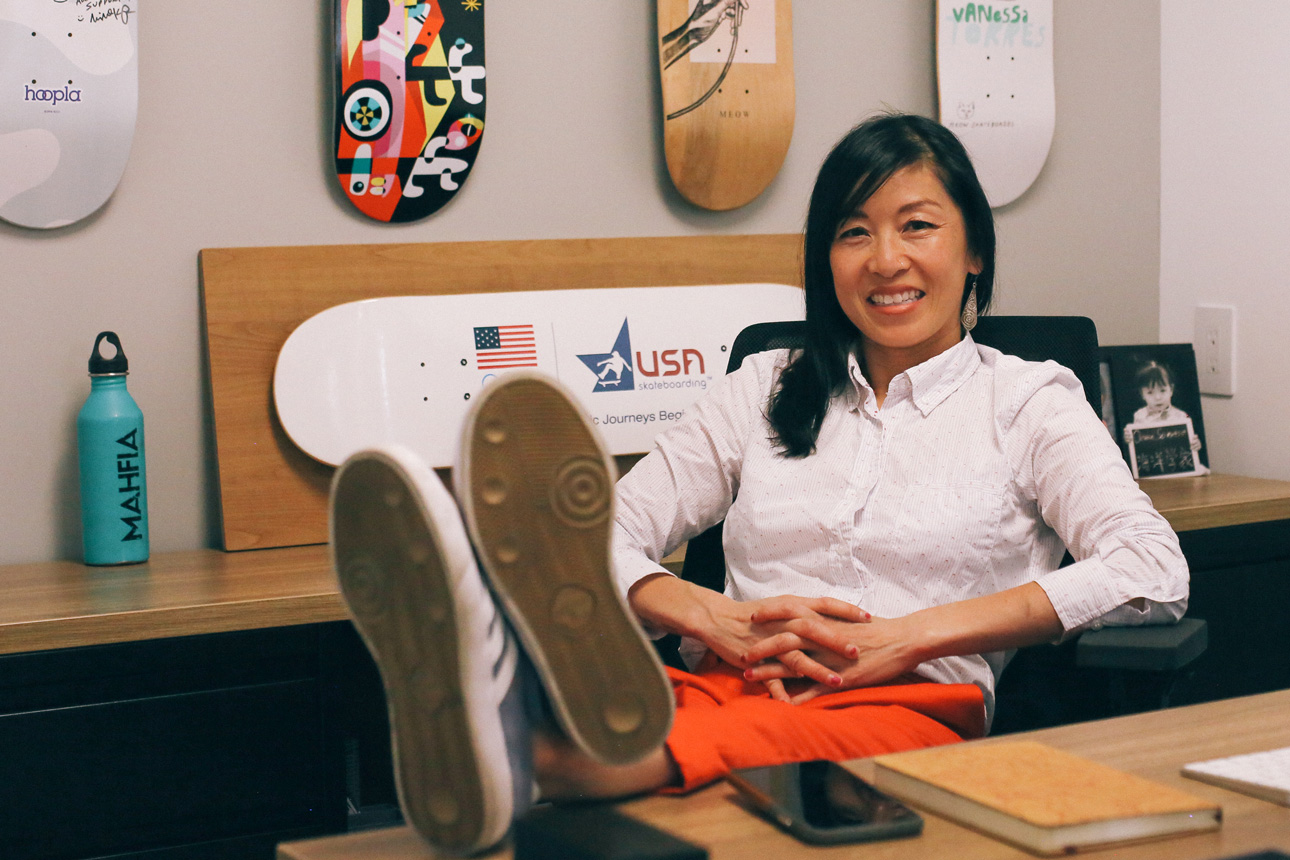
Attention to numbers and measured results are a great trait in your line of work as an action sports agent. What was your motivation to become one?
I’m a passionate person and I love to be passionate about things that I care about and to make a difference. I was drawn to the advocacy. Which reminds me of my mom. She comes from a perspective, almost to a fault, of always identifying with the under-dog and fighting for them. That can come from a perspective like maybe the world is unfair.
And what I discovered from that is that you still can be an advocate but without coming from the experience of life being unfair. I’m actually more unstoppable if I advocate for someone without having it be a fix.
My job is not only for my clients, it’s to be fully expressed and make a career doing so for myself. We’re all in the same boat. We’d all been making zero dollars. And in partnership, you know what? I remind them, let’s come from a viewpoint of abundance versus scarcity. I know we come from this idea of scarcity, that there’s not enough to go around. But if we really transform our mind set we’re going to see a shift. And that’s what’s happened over the last three years.
Can you describe some of the biggest shifts for women and non-binary, gender non-conforming skaters?
Well when I first started my own agency my clients and I created a milestone or a goal standing in the future fulfilled. Having now changed to Wasserman just a couple of months ago I have continued this practice. I ask them, “if you could wave a magic wand and anything was possible what does your optimal career and life look like?” But we started calling it a game. And the game was for them to be able to quit their day jobs and be able to skateboard full time as a career.
“Miley Cyrus’ producer calls. They say, she’s doing a music video and is going to choose individuals who are transforming the world in their advocacy and their fierceness, and would like to invite Leo Baker to be in the video.”
You have also seen some changes for your own career. You recently folded Yunexis Agency, which you founded, to go on the books as an agent for Wasserman who represent a range of elite athletes from various sports. Their motto is “push possible.” Can you describe what “push possible” means for you?
Now that several of my clients have been able to make skateboarding their “day job,” we’ve been fully creating the game 2.0. We were able to reach the first game within two years or so. It was unheard of to go from, like, Leo Baker who had been skating for ten years and had a pro model board and still never got paid by their shoe sponsors until we partnered up. Now they have become the face of Women’s Nike Skateboarding and Leo teamed up with them to promote the first ever women’s Nike SB skateboarding shoe.
My clients and I actually like to play this game where we deal in miracles. We like to list them, like, how many miracles did we create this year? Dozens have happened since. The first one you’re like, one miracle would be great. And you don’t even expect it. And now it is about expecting it. What “pushing possible” looks like to me is listening for miracles. One of the measurable results I always put in the game is that we experience a mini miracle.
For example, Leo lives in New York City and comes out for the first U.S. Olympic qualifier and is really trying to juggle competing and working out with a trainer I set them up with and also doing media and other obligations and the last thing I can imagine is putting something new in their schedule. And then because we like to play Listening for Miracles, Miley Cyrus’ producer calls. They say, “she’s doing a music video and is going to choose individuals who are transforming the world in their advocacy and their fierceness, and we would like to invite Leo Baker to be in the video. And it shoots in Los Angeles this week. Any chance of that happening?” So, there’s a mini miracle that just happened.
As an agent, how hard is it to get skateboarders to be seen as equal to bigger mainstream sports legends like Serena Williams and big football stars like we see in the “Dream Crazy” Nike Ad for instance?
I can’t speak for other folks, but for me and my clients we’ve had to self-generate the opportunities ourselves. For example, I have a marketing and PR background. My training is in telling stories, where we do this with consumer brands. With the PR/marketing background I have, I was like, look, whenever we do a launch or announcement, we need to do a press release, we need your stories to be told. No one else is going to do this for us.
I looked at when Nike was going to announce Leo Baker joining the team, and then I went out on my own and I pitched the Leo Baker story to Rolling Stone Magazine and Vogue. And I got them to agree to both do stories under embargo and drop it on the same day that Nike was going to announce Leo Baker was on the team.
So, I did my own marketing plan and PR plan. And those magazine stories made such a big splash that Nike Global saw it and was inspired to do more with us. And that’s how that ad and the global Equality ad with Colin Kaeperick and Serena Williams came about.
It’s important to acknowledge I couldn’t have done it without the community and partnership from the women’s skate community — those people know who they are, who were instrumental in creating this entire ecosystem of equal protection, opportunity, and respect. Shout out to Kim, Lisa, Mimi, Kristin and all my clients for having my back and being visionary, inspirational, and unstoppable.
What kind of things do you see for, say, Mariah Duran and Jenn Soto and their futures, following those types of achievements by Leo Baker, Leticia Bufoni, and Nora Vasconcellos?
There’s still only a handful of women in skateboarding that can skateboard full time. And Jenn and Mariah are just starting to be able to do that. Some of the younger skaters, they don’t know how good they have it in so far as they don’t know what was impossible for say a Leo Baker or Vanessa Torres. Those are the skaters who went through the driest period in terms of opportunities for women in skateboarding.
But what’s amazing is with Jenn Soto and Mariah Duran they are just old enough to have a foot in each camp. They get it and have so much drive and gratitude. They are in the middle of the revolution. They get to see both sides.
What I see for them is that the rise and duration of their careers is going to be longer simply due to age. Because the next three Olympics have skateboarding in it — though no Olympics are going to be as big as the first one of course — these younger skaters have their eye on multiple Olympics. And Jenn and Mariah, and all my competing clients, are nowhere near their full potential in terms of new tricks and just transforming the entire world of women’s skateboarding.
You played a pivotal role in the development of marketing the Street League Skateboarding event and other roles where the careers and income of male skateboarders could rapidly grow. What kinds of insights did you get from that?
It’s been my privilege to come into the women’s skateboarding space but I 100% came from a background working in men’s skateboarding. At Street League I was the first full time employee hired by the General Manager. I got to see, with the introduction of Street League during the first four years, all the evolutions that happened. It was night and day in just 4 years.
Previous to that, coming from FUEL TV I got to work with talent as a marketing manager for snowboarding and previous to that I was an intern for Circe Wallace, an agent who represented Paul Rodriguez, Ryan Sheckler and other big names. The majority of our clients were male. So what I get to bring to women’s skateboarding is what’s possible from the eyes of pro male skaters. And I saw how the women were just selling themselves short by far. If you can imagine doing a multi-day gig, and working for “exposure,” AKA free.
I get to bring bigger expectations of what the life of a professional athlete can be for men, to the women’s space. However, it took me at least two years to understand where woman skateboarders were coming from, what they believe and what their perspective is on life. It takes a couple of years to really figure it out. And it’s probably the same for others. People think they can “get” women’s skateboarding. But I never make assumptions. I always ask my clients what they want. And I am a woman even, so that just shows the gap.
I also want to clarify that I don’t think women’s skateboarding is a cause. If it’s called that then any sort of interactions around it subconsciously turn into a hand out. Women’s skateboarding is not a cause or a charity or foundation. And that’s exactly why we don’t take handouts, because it perpetuates that narrative.
What about social change and the kind of things you want to see in the bigger world?
Above and beyond sport, if we can open up the conversation globally to redefine what we think we know about gender, that would be huge. Because currently society has it that gender is black and white. That it’s binary, you’re male or female and there’s nothing in-between. And that’s a social construct that is antiquated and restrictive. It’s really something we just created using our words and that we let doctors dictate based on physicality. Gender and sex are two different things.
Let’s focus on gender, to open up that anyone, anywhere, gets to be fully self-expressed, and make a living doing so. That 100% translates if you look at my clients. They are absolutely diverse. And for all of them, especially for someone who presents as non-binary, to compete at the global level like at the Olympics, that would just elevate this. I mean Leo Baker is someone who transcends sport. And the permission that you give to young people across the world, to just be themselves, by seeing someone who is non-binary, fully self-expressed and a professional athlete, that’s the goal right there.

What are some of the social changes your clients want in order to have their voices heard and to make a difference?
When I ask my clients, like Vanessa Torres and Leo Baker, if you could transform the world what are the things that you would like to see and that you would like to be responsible for causing, they say things like authenticity, inclusivity, empowerment and community. All of our decisions stem from that.
It’s not about just hearing their feelings either. It’s about, what’s their commitment to an outcome and who they want to be in this world? What’s their legacy and how are they going to use their platform to make a difference? Especially lately, mental health has been top of mind as something they want to make a real difference in. It hits home.
“I want our narrative to dominate the airwaves because it’s from the skaters. It’s authentic, progressive and inclusive.”
What do you see as some of the next steps for your clients in terms of breaking glass ceilings?
Well, Vanessa Torres may be the first ever woman to work as an announcer, and on-air analyst at a pro televised men’s skateboarding competition. And at first you think like “whoa that’s revolutionary, how crazy,” and then you’re like, oh wait women have almost never been announced by their peers—women. And when has there ever been a woman in the judges’ booth in some of these big competitions? Not just judges for men’s contests but even women’s! It’s such a double-standard because men have always been and still are announced and judged by their peers.
If there were to be any backlash, it’s a case of getting people to think, well, how do women get judged right now, you know, at the X-Games, Vans Park Series and Street League. There’s been not one woman on the judges panel as far as I know. So, it is not a revolutionary move. It’s addressing something that is really lopsided actually. Yes it’s historic, but it’s about time.
So not only is she the first woman to judge men’s skating but also the first woman to announce men’s skateboarding. And what we’re hoping is that she is top pick for the Olympics. We’ll see. She’s been training for this, getting educated on it, she went all the way to Italy for training on being an Olympic judge and I call her Vanessa PhD. Doctor Vanessa. She’s learning and investing in both opportunities. She is into all the technical stuff and she geeks out on it. She is so hungry for this, it’s so exciting.
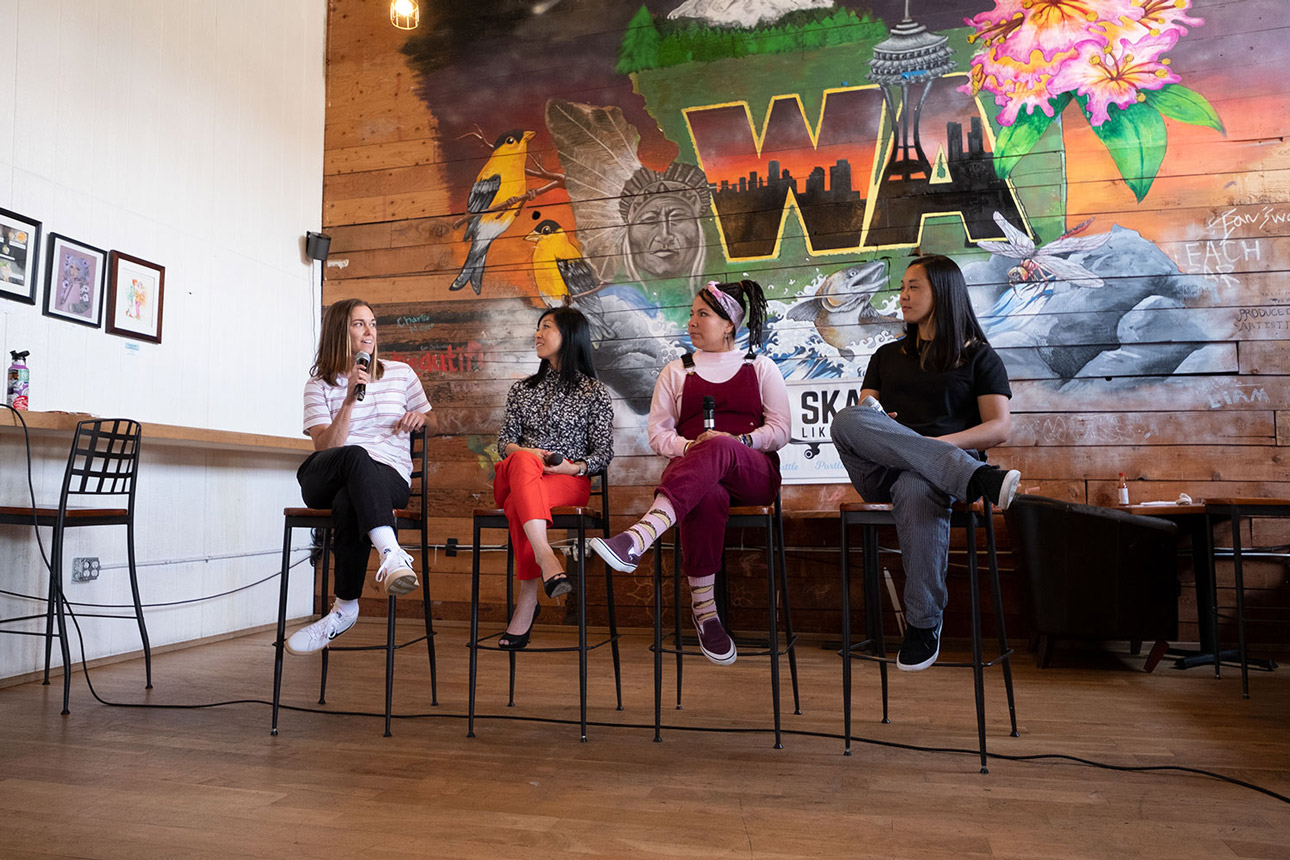
How do you navigate any doubts or negativity for these advances for women, non-binary, gender non-conforming and Queer individuals in skateboarding?
There are always all kinds of comments. And I can see the validity in everyone’s opinions. It’s not about trying to discredit anyone. And for the record, I’m not saying men will necessarily even complain. It’s more about how people are innocently, ignorantly, supportively surprised and excited to see these breakthroughs for women, but not realizing the double standard. There are just things taken for granted in men’s skateboarding that women still don’t have access to. Dew Tour, I have to say, has been at the forefront of equalizing all these things. Thank you Dew Tour.
What I do is choose the narrative that is most inclusive and fair and empowering, and just go for having the biggest megaphone. I want our narrative to dominate the airwaves because it’s from the skaters. It’s authentic, progressive and inclusive. There’s always going to be valid points from different people. That’s alright. What I ask is, “how about this narrative?” That is, the one that is the most authentic and inclusive of all womxn who are marginalized in skateboarding. Let’s just find the biggest megaphone for it. My vision is for the most positive narratives to become the most dominant.
* Update: Leo Baker changed their first name in January 2020 and now go by the pronouns he/they. This interview has been edited to reflect that change.
Interview: Indigo Willing
Photos: Courtesy of Yulin Olliver
Shot over three days in Samarria's hometown, "Samarria Brevard: No Handouts" is an immersive documentary capturing her current mindset as…
The women's finals for the first stop of the 2019 SLS World Tour went down in London today with Brazil…
Zorah Olivia and Olga Aguilar were behind their camera's at Dew Tour last week capturing all the action in the…